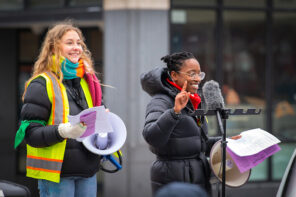Yesterday, the Supreme Court of the United States struck down key parts of the Voting Rights Act of 1965.
The legislation prohibiting voting practices that discriminate against persons based on their race was signed into law after relentless work of civil rights advocates such as the late Rev. Dr. Martin Luther King Jr., John Lewis, Julian Bond, the late Rev. Bruce Klunder, the late James Earl Chaney, the late Andrew Goodman and the late Michael Henry Schwerner.
The law—which has helped stop recent discriminatory voter identification mandates—is the very law that helped put into office President Obama and the numerous and remarkable women and people of color who serve as leaders on Capitol Hill and who have helped usher in this great moment in United States history.
While I celebrate today’s landmark SCOTUS decision on DOMA, I do so with the bittersweet memory of its decision yesterday against the 1965 VRA.
Moreover, my celebration is mixed with a bit of anger at the frail response to the VRA decision by national LGBTQ organizations. I, like many other LGBTQ persons of color and allies, don’t know quite what to make of groups whose response was either silence or signing onto to a collective statement against the voting rights ruling, only to send out major singular agency statements on the DOMA and Prop 8 rulings.
Did yesterday’s ruling not deserve the same measure of response? What is more, to see the attachments to these mailings asking for contributions to further the work of “equality for everyone” means little when there exists only a modicum of understanding of the interrelatedness of oppression.
How do you jump and shout today after such tepid response yesterday?
Time and again, members of the Black community have felt the brunt of angry white LGBTQ persons who have declared we are the reason such legislation as Prop 8 gets enacted. To counter, national LGBTQ agencies have even initiated strategies to increase Black allies in support of their work, especially state approval of same-sex marriage.
While I am a staunch advocate of LGBTQ rights, as a Black lesbian, I find it disheartening as I compare and contrast yesterday and today’s response from LGBTQ organizations. The decision by these groups not to issue individual statements leaves them vulnerable to criticism such as mine and to the more serious question: “Are you really concerned about injustice for all people?”
Until these organizations do a better job responding to racism, they will never overcome the shadow of suspicion, which they struggle under within communities of persons of color. The rainbow is not only about LGBTQ rights but justice for all.




